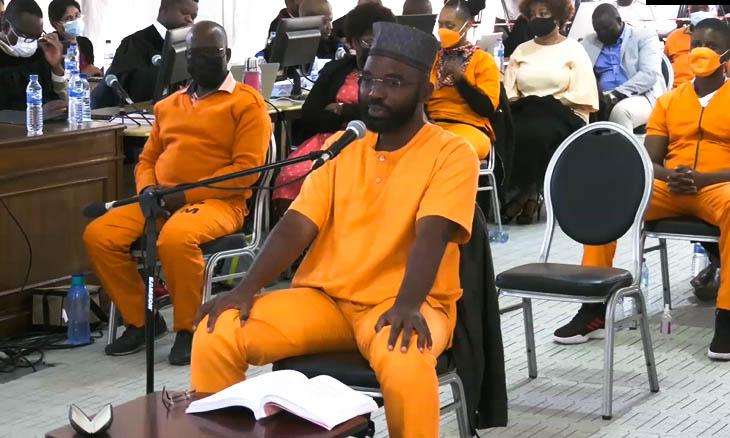Africa-Press – Mozambique. The former head of economic intelligence in the Mozambican security service, SISE, Antonio Carlos do Rosario, on Thursday apologised to judge Efigenio Baptista for behavior which almost had him expelled from the courtroom where he and 18 others are on trial for crimes connected to the country’s largest financial scandal, known as the case of the “hidden debts”.
Questioned by Flavio Menete, of the Mozambican Bar Association (OAM), which is assisting the Public Prosecutor, Rosario lost his temper, and even demanded that Menete be removed from the court.
Menete wanted an explanation for loans that a man named Imran Issa had made to SISE. Rosario claimed that this money (at least 50 million meticais – over 781,000 US dollars at current exchange rates) was for SISE “special operations”, the nature of which he did not explain.
He claimed that, at a time when Menete was a director of the Criminal Investigation Police (PIC), PIC had detained Imran for more than 24 hours. Rosario accused PIC of “kidnapping” Imran, an accusation Baptista found “very serious”.
The judge pointed out that Imran was released without charge, and thought there was nothing untoward in the police investigating the origins of a large amount of money carried in cash.
Rosario flew into a rage, repeatedly interrupted Baptista, and at one point even threatened him. Last week, the judge had removed his lawyer, Alexandre Chivale from the case, and Rosario thought he should now do the same with Menete, simply because he had once worked for PIC.
“Throw Menete out of here!”, he urged.
Baptista did not take kindly to one of the accused telling him who could attend the trial and who could not. “Today, you have repeatedly interrupted the court and repeatedly raised your voice”, he said.
This reminded him of Rosario’s behaviour on the first day of his testimony, when he had insulted the judge, and insulted public prosecutor Sheila Marrengula. Then Rosario had declared that, since Baptista had already made up his mind, “you’d better deliver your sentence now”.
Baptista had warned him that, if there were any more such outbursts, his interrogation would be interrupted and he would be returned to prison to await the day of the verdict. That day had now come. “It is up to the judge to impose discipline”, Baptista declared.
He declared a 15 minute interval, after which Rosario’s interrogation would be considered terminated.
However, the defence lawyers pleaded with Baptista to change his mind – which he did, after a private discussion with Menete, and a public apology from Rosario.
So the interrogation by Menete continued, and Rosario made clear that he had no intention of apologising for his role as chairperson of the three fraudulent companies at the heart of the scandal, Proindicus, Ematum (Mozambique Tuna Company) and MAM (Mozambique Asset Management).
Asked if there was anything he regretted, Rosario said that, on the contrary “I am very proud of what I did. If I were to be faced with the same situation, I would not hesitate to do the same again”.
He was only sorry that he did not have the power to prevent unnamed members of the government from “sabotaging” the three companies.
Rosario’s new defence lawyer, Isalcio Mahanjane, asked him soft questions, which allowed him to give vent, once again, to his fury that the government had brought in the company Kroll Associates to undertake an independent, forensic audit of Proindicus, Ematum and MAM. He claimed, without any evidence, that Kroll was a nest of western spies.
“Those who brought Kroll here were opening the door to a bloodbath”, he claimed. In this fantasy, the Kroll audit risked turning Mozambique into “another Iraq or Libya”.
The Kroll audit had exposed the Abu Dhabi based group Privinvest as a criminal outfit which had defrauded Mozambique of hundreds of millions of dollars. Privinvest was the sole contractor for Proindicus, Ematum and MAM, and the loans of over two billion dollars which the companies received from the banks Credit Suisse and VTB of Russia were sent, not to Maputo, but to Privinvest.
Privinvest then sent grossly overpriced fishing boats, patrol vessels, radars and other assets to Mozambique. When Kroll hired independent experts to look at the assets, they found that Privinvest had over-invoiced the Mozambican companies by about 714 million dollars – or over a third of the total loan amount.
Rosario flatly denied there had been any over-invoicing and insisted that Privinvest was one of the world’s major shipbuilding companies. “You can find that out from YouTube or Google”, he said.
AIM took him up on this, and undertook a Google search for “world’s largest shipbuilding companies”. The first eight names on this list are all East Asian (from China, South Korea and Japan). Italian and Russian companies are number nine and ten. The name of Privinvest is nowhere to be seen.
For More News And Analysis About Mozambique Follow Africa-Press






